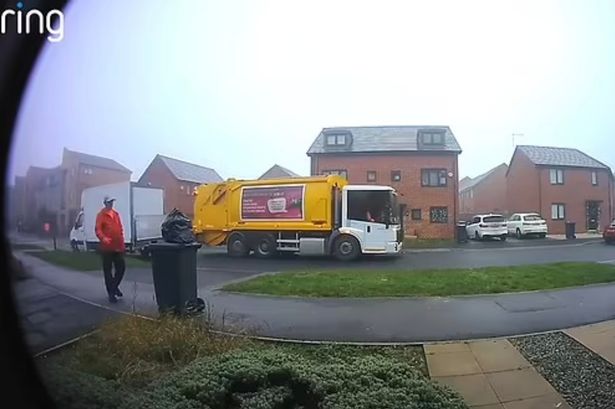The incident, captured on video by a Hull resident, sparked a heated debate about the responsibilities of both residents and refuse collectors during the busy Christmas period. The video depicts a binman removing a black refuse sack placed atop an already full wheelie bin and leaving it on the ground beside the bin. The resident who filmed the incident criticized the binman’s actions, characterizing them as “petty” and expressing frustration that the bag, containing excess Christmas waste, was left uncollected. This single act ignited a broader conversation regarding the complexities of waste management, particularly during the holiday season when household waste volumes significantly increase. The incident underscored the challenges faced by refuse collectors and the potential for misunderstandings between residents and waste management services.
The resident’s perspective emphasized the inconvenience and frustration of having overflowing bins during a time of year already laden with the pressures of holiday preparations. With the increased volume of packaging, food waste, and other refuse generated during Christmas, many households struggle to contain their waste within the confines of their standard wheelie bins. The resident argued that the binman’s actions added to the already stressful situation, leaving them with the burden of dealing with the uncollected waste. Furthermore, the resident’s use of the term “petty” suggests a perceived lack of empathy and understanding from the refuse collector, viewing the act of leaving the bag as unnecessarily punitive. This sentiment resonates with the challenges many residents face in managing excess waste, feeling unsupported by the very services designed to assist them.
Conversely, the incident also shed light on the demanding realities faced by refuse collectors, particularly during the holiday period. Working long hours under pressure to maintain collection schedules, binmen are tasked with managing a significantly higher volume of waste than usual. They operate under strict guidelines and safety protocols, including restrictions on lifting overweight bins and handling loose refuse bags that may pose health risks or contain hazardous materials. While the specific circumstances surrounding the incident in Hull remain unclear, it’s possible that the binman’s decision to leave the bag was rooted in these operational constraints or safety concerns. Overloaded bins pose a risk of injury to refuse collectors and can also damage collection vehicles. Furthermore, loose bags can easily tear, scattering waste and creating a public health hazard.
The incident in Hull highlights a systemic issue within waste management, where the surge in household waste during holiday periods creates a strain on existing resources and infrastructure. The increased volume of waste often exceeds the capacity of standard collection services, leading to overflowing bins and uncollected refuse. This problem underscores the need for a more comprehensive approach to waste management, including strategies to reduce waste generation, improve recycling efforts, and enhance the capacity of collection services during peak periods. Innovative solutions such as flexible collection schedules, temporary overflow bins, and public awareness campaigns about responsible waste disposal could help mitigate the challenges faced by both residents and refuse collectors.
The debate triggered by the video also touches upon the broader issue of communication and understanding between residents and waste management services. Clear guidelines and effective communication channels are crucial for ensuring that residents are aware of their responsibilities regarding waste disposal, including proper bin usage and adherence to collection schedules. Similarly, refuse collectors need to be equipped with the resources and training to handle the increased workload during peak periods and to communicate effectively with residents in challenging situations. Fostering a sense of mutual respect and understanding between residents and refuse collectors is essential for creating a more efficient and sustainable waste management system.
Ultimately, the incident in Hull serves as a microcosm of the broader challenges facing waste management in the 21st century. It underscores the need for a collaborative approach involving residents, local authorities, and waste management services to address the growing problem of waste disposal. By working together, communities can develop innovative solutions to reduce waste generation, improve recycling rates, and enhance the efficiency and effectiveness of waste collection services. This will require open communication, a willingness to adapt to changing circumstances, and a commitment to creating a more sustainable future for all. The incident, while seemingly minor, provides a valuable opportunity to reflect on our individual and collective responsibilities in managing waste and to work towards building a more resilient and responsible waste management system.














